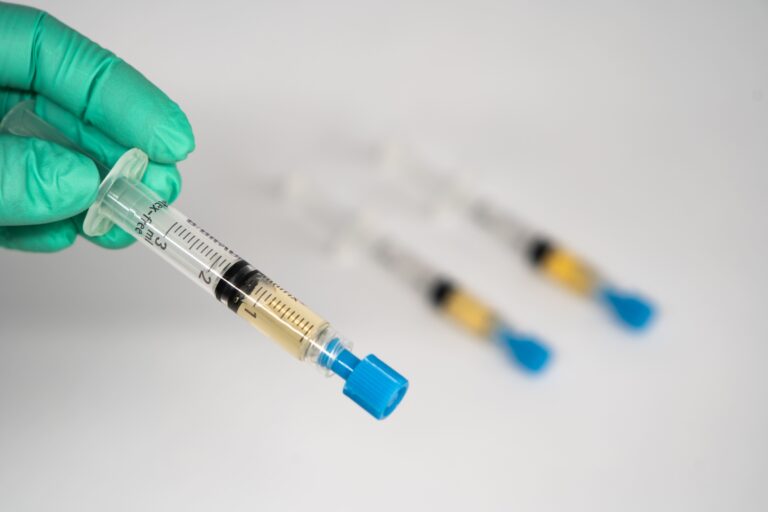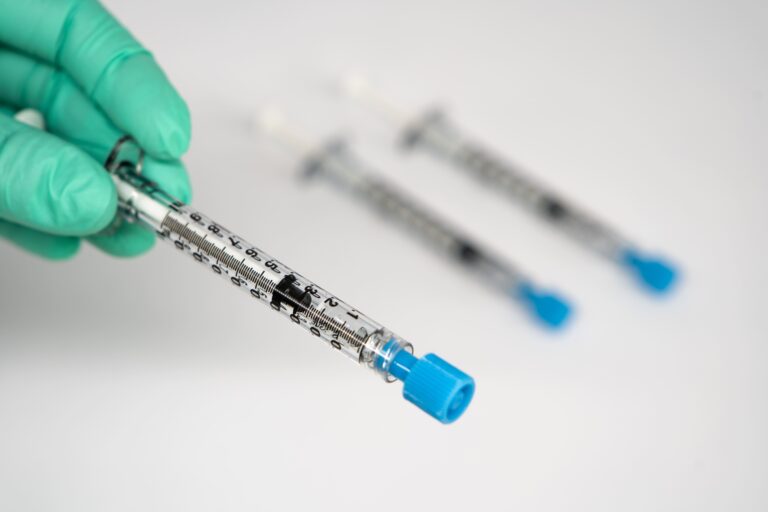Medicinal Products
The medicinal products are classified as investigational medicinal products and are manufactured aseptically in certified cleanrooms under Good Manufacturing Practice (GMP) conditions, using state-of-the-art technologies in both production and quality control.
The products are tested in collaboration with selected healthcare institutions in phase I–II clinical trials, and the results are published in internationally recognized journals.
BiCure® ortho MSCp

- Composition: Cultured autologous mesenchymal stem cells in autologous plasma
- Indication: Treatment of damaged articular cartilage
- Phase of Development: Phase I clinical trial completed, Phase II ongoing
Stem Cell Therapy for Knee Cartilage Damage
The treatment of traumatic and degenerative damage to articular cartilage has undergone significant progress over the past decades, both scientifically and surgically. However, many questions remain unanswered and continue to be the subject of ongoing research and professional debate. Standard surgical techniques often result only in filling the defect with fibrous cartilage or cartilage-like tissue. These substitutes have substantially poorer properties than healthy articular cartilage and are unable to restore normal joint function in the long term.
Bioinova, a.s. is engaged in research on the treatment of knee cartilage using stem cells. These cells have the ability to divide and replace damaged or missing cells, thereby supporting tissue regeneration. Cartilage itself does not contain stem cells, but they can reach the site of damage from the bone marrow—for example, during the microfracture technique, which is commonly performed as part of surgical cartilage defect repair. However, bone marrow contains only a very small proportion of stem cells (approximately 0.1%), which is why alternative methods of delivering stem cells into the damaged tissue are being developed.
BiCure® orthoMSCp contains stem cells derived from the patient’s bone marrow, which are expanded during manufacturing. During surgery, these cells are applied onto a three-dimensional scaffold that is then implanted into the damaged cartilage in the knee. Application and fixation of the cells are carried out using a patented method (CZ32739U1) that ensures the cells remain in place and do not disperse into the joint cavity.
In the completed phase I clinical trial, the safety of BiCure® orthoMSCp was confirmed. Its efficacy is currently being evaluated in an ongoing phase II trial. All studies are conducted in accordance with applicable legislation and based on the approval of the State Institute for Drug Control (SÚKL) and the relevant ethics committee.
Phase I - Completed
Title: Bone Marrow–Derived Stem Cells on a 3D Scaffold for the Treatment of Knee Cartilage Damage. An Open Clinical Trial to Assess Safety and Feasibility.
EudraCT Number: 2018-004067-31
Study Site:
- Department of Orthopedics and Department of Sports Medicine, Masaryk Hospital, Ústí nad Labem
Number of Patients: 6
Follow-up Duration: 2 years (9 visits in total)
Current Status: Completed (data published in Neckář et al., 2023)
Phase II – Patient Follow-up
Title: Efficacy of Bone Marrow–Derived Stem Cells on a 3D Scaffold in the Treatment of Knee Cartilage Damage. A Randomized, Controlled, Open-Label, Multicenter Clinical Trial.
EU Trial Number: 2023-503486-32-00
Study Sites:
- Department of Orthopedics and Department of Sports Medicine, Masaryk Hospital, Ústí nad Labem
- Department of Orthopedics, University Hospital Hradec Králové
- Department of Orthopedics, Teplice Hospital
Number of Patients: 40 (patients under 55 years of age with knee cartilage damage and in good overall health)
Follow-up Duration: 2 years (7–8 visits in total)
Current Status: Patient follow-up
BiCure® ophthalmo MSCs

- Composition: Cultured autologous mesenchymal stem cells in BiCureSol® solution
- Indication: Treatment of degenerative retinal diseases (e.g., AMD)
- Phase of Development: Phase I clinical trial
Stem Cells in the Treatment of Degenerative Retinal Diseases
Degenerative retinal diseases (such as retinitis pigmentosa, Stargardt disease, or dry form of age-related macular degeneration) are the leading cause of irreversible blindness in developed countries. The early form of the most common one—age-related macular degeneration—affects up to one-quarter of people over the age of 75.
Currently, no approved treatment in the EU can eliminate the cause of these conditions and reverse their progression. A healthy lifestyle, a balanced diet, and dietary supplements are recommended only to slow disease progression. Due to the absence of effective therapies, degenerative retinal diseases are a frequent subject of clinical research. One of the most promising therapeutic approaches involves the use of stem cells.
BiCure® ophthalmoMSCs contains stem cells derived from the patient’s bone marrow, which are expanded during manufacturing and subsequently administered into the affected eye. Research to date suggests that these stem cells release factors that promote the survival and regeneration of retinal photoreceptors and glial cells, reduce oxidative stress–induced damage, and suppress undesirable immune reactions. Some of the cells may also integrate into the retina, directly replacing damaged or missing support cells, pigment cells, and—at least partially—photoreceptors. This innovative therapy is protected by patented technology (CZ309716B6)d, ensuring a scientifically validated and unique approach to retinal regeneration.
The clinical evaluation of BiCure® ophthalmoMSCs is being conducted in collaboration with ophthalmologists from the Retinal Center at the Gemini Eye Clinic in Zlín.
Phase I – Upcoming
Title: Suspension of Human Autologous MSCs in BiCureSol® for the Treatment of Degenerative Retinal Diseases. An Open Clinical Trial to Assess Safety and Tolerability
EU Trial Number: 2023-503573-38-00
Study Site: GEMINI Eye Clinic, Zlín
Number of Patients: 10
Follow-up Duration: 1 year
Current Status: In preparation

